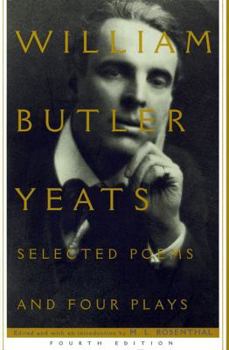Selected Poems and Four Plays
Select Format
Select Condition 
Book Overview
Since its first appearance in 1962, M. L. Rosenthal's classic selection of Yeats's poems and plays has attracted hundreds of thousands of readers. This newly revised edition includes 211 poems and 4 plays. It adds The Words Upon the Window-Pane, one of Yeats's most startling dramatic works in its realistic use of a seance as the setting for an eerily powerful reenactment of Jonathan Swift's rigorous idealism, baffling love relationships, and...
Format:Paperback
Language:English
ISBN:0684826461
ISBN13:9780684826462
Release Date:September 1996
Publisher:Scribner Book Company
Length:320 Pages
Weight:0.87 lbs.
Dimensions:0.9" x 5.5" x 8.4"
Customer Reviews
4 ratings
Questions
Published by Thriftbooks.com User , 18 years ago
During a recent fright when we were escaping our apartment down a ladder, I took two books with me, thinking that perhaps I would need something strong. Happily Yeats's SELECTED POEMS AND FOUR PLAYS was at hand, together with, well, something private. This book, edited by the late M.L. Rosenthal, is an expanded edition of a previous book by Rosenthal that had the same title except it was called, SELECTED POEMS AND TWO PLAYS. This present edition doubles the number of plays it prints in one stroke, adding the very late THE DEATH OF CUCHULAIN as well as the strange, feverish THE WORDS UPON THE WINDOW-PANE. Previously we had only the two plays PURGATORY and CALGARY. Did I say CALGARY? I meant, CALVARY, and neither of them are worth the paper they're printed on. In college my professor used to tell us that Yeats, together with his patron Lady Gregory, invented the Abbey Theater and kept it going by writing plays annually and encouraging their society friends not only to attend but to pledge money in exchange for participation in a community-based theater. However, according to Rosenthal, some of Yeats' plays were distinctly unpopular even with this sudsidized theater and neither the actors nor the audience loved them to death. As a boy, my dad used to quote Yeats on every occasion and he (Yeats) was a patron saint to many Irishfolk. Today not so much, but as I made my way down the ladder I was glad I had the Yeats book tucked into my pants. He is the epitome of the artist who keeps changing through circumstance, open to new influence, even partial to drugs, for many credit his late flowering to the monkey glands he took in Switzerland to rejuvenate his sex life, the precursor to today's Viagra. In his youth he became a member of a secret band called the Order of the Golden Dawn, and spiritualist interests fueled his poetry and politics both. On his honeymoon he discovered that his wife, Georgie, had mediumistic leanings, and they spent many night holding seances and conversing with the spirits of the dead, all of whom, or so Yeats claimed, had arrived to dispense new metaphors for his poetry. He later wrote up these events in his book A VISION. Rosenthal was a superb editor who went back and checked all of the original manuscripts and who could distinguish Yeats' handwriting in all its different avatars, and this helped him date the poems to within an inch of their lives. His task was made no easier by Yeats' habit of revision and by his need to provide an income for his sisters, who wound up producing elaborate private, limited printings of much of his work to sell to collectors only at absurdly inflated prices. These books are beautiful but useless, like so many of the romantic Irish flourishes the poet's late work commemorates only to condemn. It is a poetry of questions, which always appeals to young people, those who know the answers. "What's water but the generated soul?" (That one always threw me.) "How can we tell the dan
The golden apples of the moon, the silver apples of the sun
Published by Thriftbooks.com User , 19 years ago
Yeats lives in the minds of most lovers of great modern poetry through lines of incredible beauty. "And we will wander hand in hand Through hollow lands and hilly lands, And pluck till time and times are done, The golden apples of the moon, The silver apples of the sun. "We must lie down where all the ladders start In the foul rag- and- bone shop of the heart" "But one man loved the pilgrim soul in you, and loved the sorrows of your changing face" "An aged man is but a paltry thing a tattered soul upon a stick unless soul claps its hand and sing.. Yeats believed in much nonsense in his life, and apparently was not the kindest of human beings but he wrote some very great poetry.
Poems Not To Be Read, But Learned By Heart
Published by Thriftbooks.com User , 22 years ago
In 250 years the mass of pablum we currently pass as literature will be blown away like chaff in the wind.One of the hard and nourishing kernals left on the threshingroom floor will certainly be Yeats.These are poems not to be read, but learned by heart.Among my favorites from this collection (with years of composition) are: "The Stolen Child", "To an Isle in the Water" and "Down by the Salley Gardens" (1889); "The Lake Isle of Innisfree" and "When You Are Old" (1893); "He Wishes for the Cloths of Heaven" (1899); "The Folly of Being Comforted" and "Adam's Curse" (1904); "All Things Can Tempt Me", "Brown Penny" and "To a Child Dancing in the Wind" (1910); and "The Cat and the Moon" and "Two Songs of a Fool" (1919).
A wonderful introduction to Yeats
Published by Thriftbooks.com User , 24 years ago
I picked up this book of poems as an introduction to Yeats and found it to be wonderful. It contains major works from all of his periods and four plays as well. Highly recommended, for poetry lovers and those with only a passing interest.





